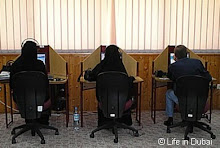But, mainly because the UAE gets a high ranking, HSBC's survey of expats has been given a lot of media coverage.
In what's claimed to be the world's largest expat survey, they had response from 2,155 expatriates across four continents about the opportunities and challenges that come with a life away from home.
What I can't find is who the respondents were.
Pretty obviously though, the results are referring to western, management-level expats and as we know in Dubai that's a tiny sample of the global expatriate population.
According to the results, while half of expats spend more on food, shopping and socialising in their new country of residence they also save and invest more than they did in their country of origin.
While I was reading the reports an e-mail arrived from a friend about the effect of Dubai's inflation at street level. It also shows how unrepresentative the much-publicised survey is of most expatriates.
Ten years ago my friend started using an automatic car wash, where 5 guys dry and vacuum your car afterwards. In 1998 it cost Dhs 15, in 2001 it went up to Dhs 20 where it stayed until 2006 when it went to Dhs 25. Because of Dubai's rents my friends moved to Umm Al Quwain and hadn't used the carwash for a while. Yesterday they did and the price is Dhs 35.
I'll just quote the e-mail:
I commented to Suresh (one of the cleaners that has been there since 1998 at least) about the high price.
He tells me "Yes, madam. Everything too much expensive now. After Diwali this year I will return home to my family. There in India I can work as a driving instructor and earn a better salary than I earn here (at the car wash he earns a basic salary of Dh950, with approx. Dh200 in tips every month) and I only work 8 hours (and not 12 hours like in Dubai) and my family is there.
I need to make savings for my children's education and I cannot do that here in Dubai. Now with the new visa laws, it will also be very difficult to bring them here, even if I stay and get a better job."
She related this to a colleague. He had a similar story.
From when he arrived in Dubai three years ago, cleaning and ironing a shirt cost Dhs 7. When he picked-up his shirts yesterday he was told that they now cost Dhs 11. The friendly attendant who knows him well apologized and said that next month they'll be Dh13, and not surprisingly "customers are leaving us now".
He went on:
"For me also, there is no more reason to stay in Dubai. I am going home to Bangladesh, there I will work in a call centre, I earn the same salary as here (Dh1,400 a month) but I only work 8 hours a day (and not 10 to 12 hours at the dry cleaners). There, I can live with my family and make many savings."
And my friend makes an interesting point:
Everyone talks about the "Brain Drain" in the GCC… of highly educated Arabs seeking employment in the West. What about the "Muscle Drain", i.e. all the service staff like waiters, delivery drivers, store attendants, etc. etc. etc. who can no longer afford to stay here?
Dubai is far from unique in becoming too expensive for the essential lower-paid people to live in, cities around the world are struggling with the problem. But we need so many more than most cities because of the frantic construction and expansion, so solving the problem is more urgent here.
Back to the survey and a sample of the headlines: "The United Arab Emirates is the most luxurious place for an expat to live" and "UAE tops in providing luxury to expatriates" and "High salaries pull in expats".
Unless you're a highly paid western managerial expat, you might want to treat them with some scepticism.
Expats enjoying Dubai's luxurious lifestyle...































